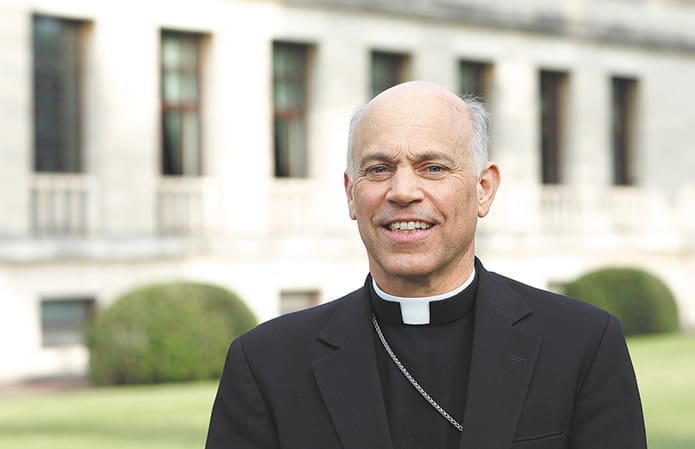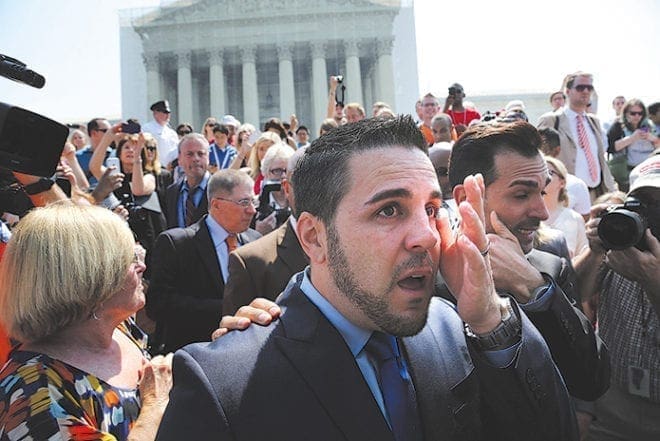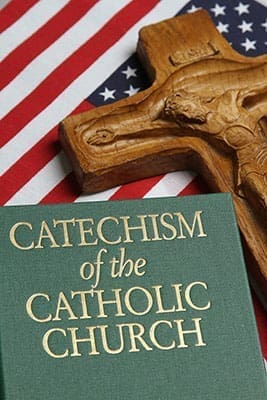 CNS photo/Paul Haring
CNS photo/Paul HaringRome, Italy
Supreme Court DOMA Decision: U.S. Archbishop: Rulings suggest ‘worrisome’ future
Published July 4, 2013
ROME (CNS)—The “future of our democracy” is “very, very worrisome,” U.S. Archbishop Salvatore J. Cordileone said in reaction to the U.S. Supreme Court’s June 26 rulings striking down the federal Defense of Marriage Act and refusing to rule on the merits of a ban on same-sex marriage in California.
The court high court remanded the California case to lower courts on the grounds that the individuals who defended the law in court lacked legal standing to do so.
Archbishop Cordileone of San Francisco, chairman of the U.S. bishops’ Subcommittee for the Promotion and Defense of Marriage, spoke to Catholic News Service in Rome the day the court handed down its two decisions.

Jeff Zarrillo, center, and Paul Katami, right, plaintiffs in the case against California’s same-sex ban known as Proposition 8, wipe away tears and greet supporters as they depart the Supreme Court in Washington June 26. CNS photo/Jonathan Ernst, Reuters
He was there to receive his pallium from Pope Francis in a ceremony June 29, the feast of Sts. Peter and Paul. The pope will present palliums to archbishops named in the past year. The woolen stole signifies an archbishop’s authority over the Christian community.
In addressing the court’s refusal to rule on the merits of a challenge to California’s Proposition 8, the voter-approved initiative barring same-sex marriage, Archbishop Cordileone noted that 7 million voters in California voted for the proposition and “many of them invested a lot of hard work and a lot of time and lots and lots of money against seemingly insurmountable odds.”
When the state “refused to defend the law,” he said, its proponents hired legal counsel, raised money and invested hard work to defend it. “Now they’re being told that those elected officials charged with the duty of defending the laws of the state can refuse to do their duty simply because they disagree with the law and disenfranchise 7 million voters,” he said.
In response to the court’s ruling that DOMA is unconstitutional under the Equal Protection Clause, Archbishop Cordileone said the court “overturned a law that respects and enforces the principle that it’s in the best interests of the child to be raised by their mother and their father.”
He said the effect of the court’s decision is to “undermine in the law the principle that children have a right to a mother and father.”
He also noted that to have a “healthy vibrant society we need to reclaim a marriage culture.”
The archbishop pointed out that he has said all along that no matter how the court ruled “our work remains unchanged. We need to catechize our people about marriage.”
“Even if the court issued a ruling that we liked, we would still have a lot of work to do in helping our people understand what marriage really is, why marriage is important for the public good and why it’s essentially an institution to support social justice, justice for the sake of children,” he added.
Archbishop Cordileone said marriage has the status that it does in law because it has always been a child-centered institution. Redefining marriage, he said, turns it into an “adult-centered institution” where the government “doesn’t have an interest in people’s love lives” or in “how people work out their intimate relationships.”
In a joint statement Cardinal Timothy M. Dolan of New York, president of the U.S. Conference of Catholic Bishops, and Archbishop Cordileone called the rulings a “tragic day for marriage and our nation.”
The statement said the court “has dealt a profound injustice to the American people by striking down in part the federal Defense of Marriage Act.”

Photo Illustration By Michael Alexander
“The court got it wrong,” they continued. “The federal government ought to respect the truth that marriage is the union of one man and one woman, even where states fail to do so. The preservation of liberty and justice requires that all laws, federal and state, respect the truth, including the truth about marriage.”
They urged people to “stand steadfastly together in promoting and defending the unique meaning of marriage: one man, one woman, for life.” They also asked for prayers “as the court’s decisions are reviewed and their implications further clarified.”
Baltimore Archbishop William E. Lori said the court’s decisions were the “latest in a troubling trend of decisions by lawmakers, judges, and some voters which ignores the fundamental truth about marriage: It is the most valued, most important social unit in our society and as such is deserving of the protection and special recognition societies have afforded it throughout human history.”
The archbishop, who is chairman of the U.S. bishops’ Ad Hoc Committee for Religious Liberty, said the courts’ decisions will “also undoubtedly contribute to concerted efforts not just to redefine marriage but to dismantle it, efforts which represent a serious threat to religious liberty and conscience rights for countless people of faith.”
Archbishop Timothy M. Broglio of the U.S. Archdiocese for the Military Services said that although the Supreme Court “avoided a firm declaration about same sex-marriage, it signaled that attempts by the federal government to limit rights available under state law could be unconstitutional.”
In light of the court’s decisions, the archbishop said it “seems imperative to remind the faithful of the Archdiocese for the Military Services that they must never forget that all, regardless of their sexual inclination, must be treated with the respect worthy of their human dignity.”
He said that while the court’s decision “voids federal law it opens the doors to others: It allows the citizens of each state the opportunity to uphold the true definition of marriage by voting for representatives and legislation that defend the true definition of marriage.”
The bishop urged Catholics to “make their voices heard through the democratic process by upholding marriage in their home states,” saying he remains confident that Americans will “continue to promote and defend the good and the truth of marriage as the union of one man and one woman as husband and wife for life.”
“Marriage remains what it has always been, regardless of what any government might say,” he added.
According to a study issued May 30 by the Washington-based Public Religion Research Institute, 62 percent of U.S. Catholics support same-sex marriage; overall, 52 percent of Americans support such marriages and 43 percent oppose them.